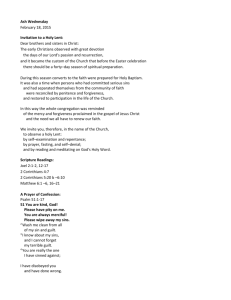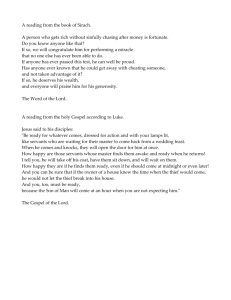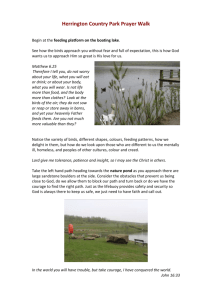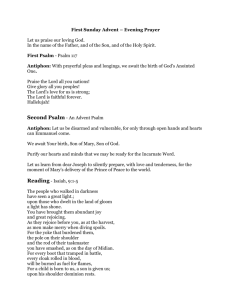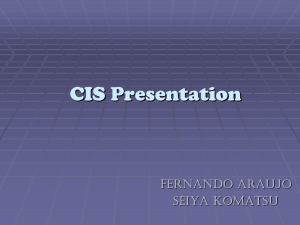Liturgy and Life Session 4
advertisement
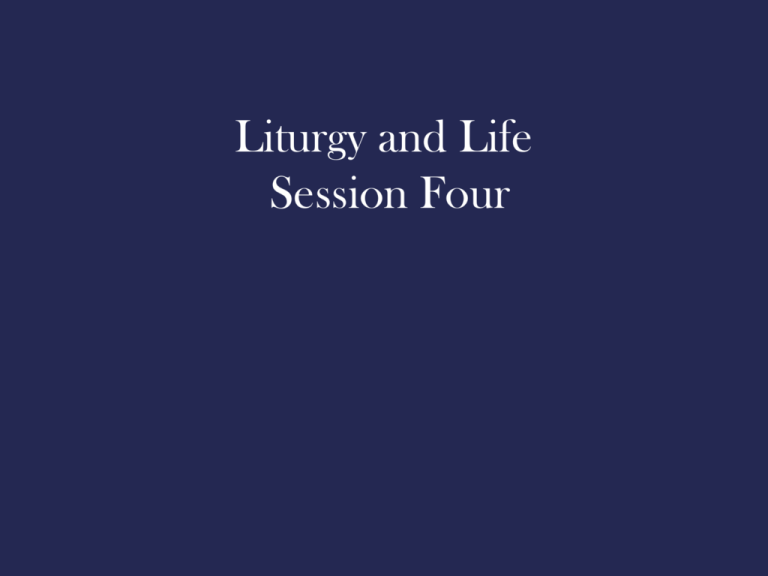
Liturgy and Life Session Four The Holy Eucharist The Holy Eucharist “The Lord’s service for the Lord’s People on the Lord’s Day”: the Risen Christ gathers his people to celebrate and receive His grace The Sunday Eucharist is the Church’s central act of worship • Original and consistent practice • Gathers all forms of prayer • Proclaims God’s Word in its fullness • Climax of the Church’s sacramental life • Expresses all aspects of Christian discipleship Adoring God “The leading principle of the Prayer Book is, that the public devotions of the Church must consist chiefly in words and acts by which God is adored.” J. H. Blunt Why is God worthy of our adoration? Do you think the church is sometimes tempted to lose track of its audience? Why? How does adoring God help us put our own life in proper order? Blessed be God: Father, Son and Holy Spirit. And blessed be his kingdom, now and forever. We begin by acclaiming the Lord—not talking about ourselves: we are not the center of the universe Berakah: classic Jewish prayer form—blessing God for his mighty acts. How has God established his kingdom? How do we show that we are members of his kingdom? “Through the Gates of Penitence” “LOVE bade me welcome; yet my soul drew back, Guilty of dust and sin.” George Herbert Adoring God forces us to recognize our own sinfulness • The words we speak do not match our deeds • God’s radiant holiness shows our dark worldliness • God’s love evokes our sorrow for wounding Him Why are our bad deeds sins against God? Christian penitence is a response of the heart—not merely a legal calculation of deeds done and not done—it is about our relationship with God, not just our own character Penitence in the Liturgy The Eucharist always begins by expressing sorrow for sin • Collect for Purity: “cleanse the thoughts of our hearts” • Kyrie: Lord, have mercy upon us • Penitential Rite: includes confession of sin and absolution (at beginning or as a part of approach to Holy Communion” Penitence and Reconciliation “In him we have redemption through his blood, the forgiveness of our trespasses, according to the riches of his grace which he lavished upon us.” Ephesians 1:7-8 Reconciliation with God is at the center of Christ’s work • Human sinfulness is our great problem • We cannot live a life of complete holiness—all have fallen short • Jesus has come to bear the burden of our sin and to reconnect us with God—at-one-ment • In His death and resurrection, Jesus has taken away our sin, opened access to the Father for us • We come to seek God’s forgiveness through Christ Confessing and Receiving Forgiveness Confessing our own sin and receiving God’s forgiveness personalizes what Christ has done • He bears our sins and releases us from their power • He assures us of God’s mercy and pardon • He gives us strength to live a new life How can we make confession a more personal and sincere act of prayer? Praise and Petition We move from penitence to praise The Gloria is the church’s great hymn of praise— addressed to Father, Son and Holy Spirit A time of silence after the Gloria invites us to bring before God the particular needs or concerns we have—our intention. The Collect “collects up” our prayers in a single petition to God appropriate to the liturgical season
